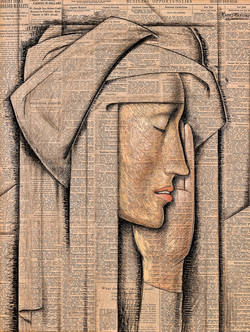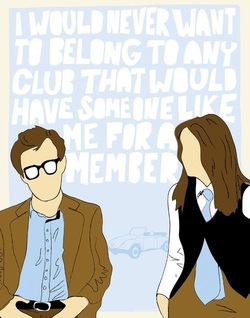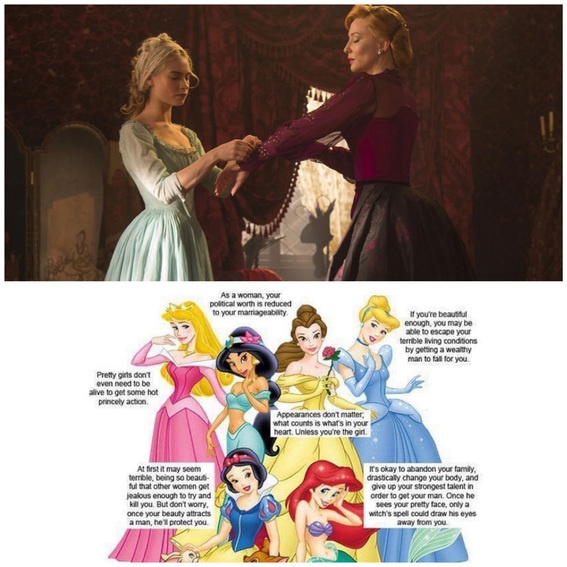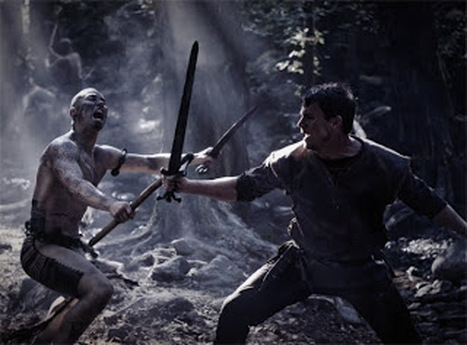|
Last night I sat on my husband's lap and cried into his shoulder. I wasn't really sure why I was crying. In some ways it felt like I was crying over nothing. In other ways it felt like I cried because of everything. I wasn't so upset that I couldn't talk. It was one of those strange moments when tears are coming out of your eyes and snot is welling up in your noes, but you look significantly worse than you feel. All of my thoughts were still with me, and unlike the many other occasions when crying makes them murkier and more confusing, last night's cry put everything into focus.
It's been a weird week. It's been hard to even know why it's been weird. I've been stressed to the max with a Master's thesis I'm trying to write. Each day I've sat down and seriously doubted everything - my topic, my timeline, my brain. Which of course has led me to doubt so many other things about myself - life choices, financial situation, calling. And when I doubt those things, I tend to go on crazy power grabbing hunts. I set my eyes on the best schools I could possibly get into. I make crazy goals for myself like working five career advancing jobs and working out every day and publishing and eating only healthy food and loving everyone I meet and serving in every way possible in my church and getting pregnant right now and cooking more often and... and... and... I recently read an article someone posted on Facebook about how women can't have it all and how we shouldn't be trying to have it all. Last night, what brought me to tears was realizing why I struggle with wanting it all. The question isn't whether I can or should try for it all, but rather, why do I even want it all in the first place? The truth is, more than anything else in life, I want glory. It's like lead poisoning in my soul. It's so much a part of my nature and a part of my environment that I don't even know it's there until I face these weeks when the sheer stress of it all makes the poisoning obvious. I have struggled with this disease my entire life. In fact, I would even go so far as saying that a lust for glory is the single more basic thing for understanding who I am and the decisions I've made. It's been intangible enough that it isn't immediately obvious when looking at my life. But when I think of my youngest self and the way I wanted, truly thirsted after being a princess, movie star, or celebrity more than anything else, I see this desire for glory. Then I grew up a little and my pre-teen interests developed and I fell in love with ice skating and dreams of going to the Olympics, and still it was there. Of course those dreams didn't last, but by then I was a teenager and the definition of glory simply changed. The glory I sought after didn't have to be world-renowned. No, I was pretty content with seeking after the more localized glory of "coolness." I wanted to be cooler than everyone else, alone in my glory among the throngs of the "uncool" world. By college, this desire hadn't quite dissipated, but a different sense of glory was growing in competition. Romance. I wanted to find the one person who would bring me the more adult glory of marriage and sex. That was a long quest, and eventually it choked out the glory of being cool. It's amazing, though, how quickly everything changed once I got married. Almost immediately, my heart made the subtle shift from relational glory to the glory of a career. With one major thing checked off, the glory quest moved on to the next thing. Sometimes I am just so damn tired of it. I have repented and repented and repented again of this thing inside me, but most often it seems like there is just so little to do about it. It is so far, deep, down in my soul that unless I am actively staring it in the face, it will resurrect. It will come back again, and then again in one form or another. It's not the whack-a-mole of sin. At least with whack-a-mole, the mole always looks the same and there are a limited number of spots where it can appear. It's more like the shape-shifting living dead - I can never tell it's there until it's eating me alive because it never looks the same. As I've been struggling through all of this over the past week, a few images have been floating through my head. First, the funerary words, "She hath done what she could," spoken in memory and honor of a dead 19th century missionary wife. (If you want to know where in the world I got that from, ask my thesis.) Second, the image of Furiosa from Mad Max. These are two very incongruous images - there probably isn't anything more oddly juxtaposed than a meek and petticoated woman from two hundred years ago and a feminist icon who rips the bad guys' heads off. But they are deeply linked in my mind. I just watched Mad Max: Fury Road for the first time last weekend. I had wanted to see it when it came out and I read all of the countless reviews raving about Furiosa. But I don't think I could have understood just how striking she is as a character until seeing the movie for myself. She is, hands down, my favorite portrayal of a heroine I have encountered to date. My favorite used to be Tolkien's Eowyn, but Furiosa cast a light on Eowyn I had never noticed before. I haven't read the books and or watched the movies for quite a long time, so my memory may be faulty, but I remember it being pretty clear that Eowyn wants the glory of battle. She is not allowed to go and so there is a lot of discussion about her desire to participate in something so honorable. She wants to protect her home and family, yes, but she honestly also just wants to be part of something so downright great. Eowyn wants glory. Furiosa, on the other hand, is not once portrayed as considering glory, or even herself, in her quest. She has a mission and she will do whatever it takes to complete it. Whereas Eowyn's desire for a glorious quest requires her to be secretive and cut off from the others, Furiosa's mission requires her to know both her strength and her weakness, enabling her to ask for help when and where she needs it. At the end of Eowyn's battle, she has done something remarkable and she has done something good, but there is much about her narrative that is clearly focused on Eowyn and her triumph as a victory for herself. At the end of Furiosa's tale, however, the clear narrative is that "She hath done what she could." I think for my entire life, I have wanted to be Eowyn. I have never been able to look beyond the glory involved in the good things there are to do. I have never been able to truly escape myself in the various quests I've set out upon. But glory is not mine to seek. Glory is something that belongs to God alone. As my sweet husband reminded me last night while my snot and mascara smeared across his sweater, one day, because I am his heir and child, God will glorify me at the end of time as he promised. "For you did not receive the spirit of slavery to fall back into fear, but you have received the Spirit of adoption as sons, by whom we cry, 'Abba! Father!' The Spirit himself bears witness with our spirit that we are children of God, and if children, then heirs - heirs of God and fellow heirs with Christ, provided we suffer with him in order that we may also be glorified with him." But let's be honest, I don't even really know what that means - to be glorified with God one day. So while I may live in the hope of glory, I really can't seek it now, in this life. In the end, I'm not even really sure what I'm trying to process in this post other than that I need Jesus. And I need whatever the anti-lead-poisoning equivalent for the soul is. Which is probably just more of Jesus. I'm really not a fan of the "just open to a certain page and find God's message for you" approach to life, but sometimes it is shocking how well it works. Most nights, I tend to just lie in bed gooning out on my phone while Trey brushes his teeth. But last night, for some inexplicable reason, I put the phone down and picked up Augustine's Confessions. I have it in my stack of books next to my bed as a hopeful "one day I won't look at my phone and will read this instead" reminder. I opened to wherever I had last left off and found the following words. "You have rescued me from all the evil roads I have trodden, and given me a sweetness surpassing all the pleasant by-paths I used to pursue. Let me have a mighty love for you; in my inmost being let me hold tight to your hand, so that you may deliver me from every temptation to the very end." (1.15.24) All of the paths of glory are my lustful temptations, but God has rescued me from them. The cure for my glory-sickened, leaden heart is the same one Augustine sought - to hold tight, very tight, in my inmost being to the hand of God. ~Hannah
1 Comment
A few years ago there was a popular cartoon floating around Facebook. It depicted the Disney princesses and then purported to unmask the true moral behind each story. Every princesses's story was displayed as derogatory to women in one way or another, and the general idea was how harmful the Disney princesses are for little girls.
While I didn't disagree with every point made in this cartoon (Belle really does seem to have Stockholm syndrome and Ariel really does promote the idea that talking isn't necessary for women to be happy in a relationship), and I do think that much about the Disney princess obsession and culture is unhealthy and at times destructive, much about the cartoon left me befuddled. In particular, I felt confused about the complaints against Cinderella. Cinderella was never my favorite Disney moving growing up and I still don't respond to it emotionally as I do to many of the other films. But my entire opinion of the story changed dramatically in my early 20s. Sometime towards the end or shortly after finishing college, I happened to watch the old cartoon while babysitting some little girls. What I saw amazed me - Cinderella is one of the most woman-centric Disney cartoons made. And I am not unversed in feminist theory - I wrote my senior thesis on the New York Heterodites and Simone de Beauvoir. Let's think about it. There are no men as central characters; all of the primary agents of action are either female or non-human (and even then, the strongest non-human elements are female). My biggest complaint about Cinderella growing up was that it did not depict true love because the prince wasn't a real figure in the story (this is still a valid complaint). But if you are complaining about misogynistic Disney movies, I suggest you reconsider the fact that Cinderella is the only Disney movie thus far in which the prince is pretty much unnecessary. It isn't a true love story, because it's not a story about love. Rather it is a story about one woman's struggle against the circumstances which keep her down. Cinderella repeatedly and methodically works to overcome that which oppresses her through decided and concerted effort with the best means available to her. Isn't this the most simplistic cause of feminism? Since this realization, I've been deeply loyal to the story, and in particular Disney's rendition of it. So, when Kenneth Branagh's version came out last month, it was with both breathless anticipation and dreadsome lothing that I went to see it. In short, this movie could not have better identified and exploited all that is marvelous for women about the Cinderella tale. I've heard many people praise it for its simplicity, lack of cynicism, and willingness to embrace fairytale. These are all indeed commendable. But I don't think it is in these things that its power truly lies. After all, there are times and places for complex stories, cynicism can speak truth, and no story but One should be left unrevised. The real power of Disney's live-action Cinderella is that they got the hidden strength and power of the story right - that not all attributes traditionally associated with women, namely kindness, are signs of weakness. As I think back on Disney's original cartoon and why the Jezebel readership despises it so much, I am convinced it is because Cinderella is too nice. I hear so much about women needing to step up and take control and it often really only amounts to devaluing kindness. As a result, stories that exemplify a woman for displaying such a trait are belittled and mocked. Kindness is associated with an inability to defend or promote oneself, so best to do away with it altogether. But is kindness really about becoming a wet rag? In order to be kind women, must we also be domineered? I find it very sad indeed to associate the two. Sometimes it feels like women are in such a rush and frenzy to do away with the things that have truly oppressed us for so many millennia that we label those true strengths that have always been ours as false and harmful. I propose that kindness is a strength women need to be careful not to weed out of our gardens in order to play with the boys. And Cinderella depicts why this is true. As women, we may be inspired by and fall in love with the Katniss Everdeens of this world. When faced with unimaginable situations, we may hope to take up our arms and fight. At times this may be available to us; there are times when fighting openly and bitterly is in our power. But what about the many times that type of fight is not in our means? What about times when the forces are just too great and we are just too small to become Katniss? What if we are Cinderella? Are we really willing to say that the only strength that matters is the strength to fight? Or do we have a definition of female power that is both big and small enough to include kindness and perseverance in times of trial and duress? Part of the debate around the Disney princesses concerns what values we want to instill in our daughters. As a child and I teenager, I didn't resonate with Cinderella. I resonated with Belle, and Mulan, and Katniss, and Eowyn - the women who were strong and could put up a good fight. I am glad that I had these characters to look up to and be inspired by and I am thankful for parents who never dampened my love of them or tried to instill a singular vision of feminine virtue. I will give my future daughter these women to admire. And I will tell her to fight when and if the time is right. But I will also give my daughter Cinderella. And if my daughter is anything like me, I will give her Cinderella more than the other women, because kindness and perseverance are not my natural gifts. I want my daughter to know that strength is multifaceted. I want her to know that kindness is not weakness. I want her to know that serving the good of others does not mean giving up her agency. Most of all, I want her to know that like Cinderella, there may comes times in which she is not enough to beat the bad guys and when or if that happens, she will need to live in such a way that acknowledges their power but not her moral defeat. As I said above, there is only one Story that does not deserve revision - it is the single story for all ages. The point of this post is not that we should withhold doubt and reexamination from the stories we tell our daughters. What we tell them does shape them more than we can ever imagine. I just don't think our current version of Cinderella is one to do away with, for it rounds out and enlivens all that we want our little girls to grow up to be. ~Hannah  I've read a couple of great posts recently and thought I would share. It's always exciting to find people either saying the things you want to say or saying things your mind simply isn't smart enough to think of. So here are some borrowed words on topics we love to discuss at Carved to Adorn. First, Ruthie found an amazing article over at First Things on Lena Dunham's Girls, Jane Austen's Mansfield Park, and the sacred stories we tell. Alan Jacobs's thoughts are chewy, but every bite is fantastic. "What we need is not condemnation of Adam, or condemnation of Hannah for liking Adam, but better art and better stories, better fictional worlds, by which I mean fictional worlds that rhyme with what is the case, with what is true yesterday, today, and forever. Not the abolition of mythic sandboxes but the making of sandboxes in which to play with true, or truer, myths: fictive spaces in which Hannah can do better than Adam, and Adam can be better than what he is, a bitter prisoner of past angers and resentments." Read it here. Second, in order to help keep the conversation about female sexuality going, I recommend Jordan Monge's post yesterday on Her.meneutics titled The Real Problem with Female Masturbation, Call It What It Is: Ladies Who Lust. I'm not sure that I agree with everything in it, but it is an honest discussion and a good place to start. Please add any thoughts you have about it to our comments! Lastly, since I'm sure we could all use a good laugh after reading the first two articles, I give you this to end on a lighter note. If you're like me and secretly wish you lived in an Anthropologie storefront, you will identify with these 87 thoughts. ~ Hannah  In the attempt to broaden my Woody Allen repertoire, I requested Annie Hall from Netflix almost three months ago; unfortunately, it sat forgotten on a shelf until tonight when I finally decided Trey and I needed a little cultural education. We enjoyed the movie well enough, but really, apart from the typical review I could write (Woody is a sad, but brilliant man; Diane Keaton is charming and absolutely deserved her Oscar; the sexual revolution has been as full of hypocrisy as anything else; were the 70s really that drug infested?), I only have one real takeaway from the film and it has nothing to do with Annie Hall. In fact, it has to do with (500) Days of Summer, or as I will now be calling it The 2009 Movie That Completely Ripped Off One Of Woody Allen's Most Brilliant. I mean, really, the two films are almost identical! Except that one was an original idea with iconic scenes and dialogue delivered by some of Hollywood's greatest and the other was a hipster rip-off by someone who either didn't care enough about the history of film to know he was copying a classic or who did know exactly what he was doing and had the gall to recognize that the average American under 30 wouldn't. The most surprising thing is that nothing has changed in 30 years concerning our views on wisdom; the moral of both movies remains the same - romantic/sexual relationships burn us, but we need them, so let the cycle continue. ~Hannah Just talked to my sister this morning and squealed for a good while about The Eagle of the Ninth coming to film next fall. Oh... my... goodness... Directed by a man who loved the book as a child? Cinematographic directing by Slumdog Millionaire's director? Channing Tatum as Marcus? (Granted he isn't a great actor, BUT perfect as Marcus!) This is a movie I will definitely see on opening day when I'm back in the States.
Enjoy the only pic that has been released so far! |
Archives
October 2018
Categories
All
|



